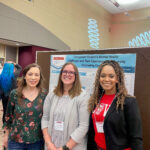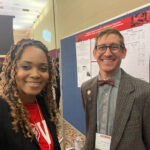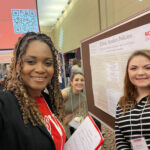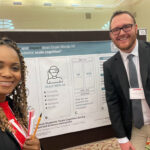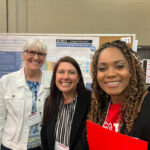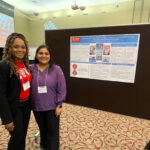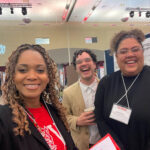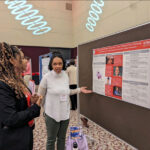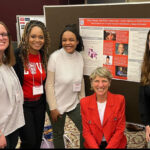College of Education Doctoral Students Recognized During NC State’s 2024 Graduate Student Research Symposium
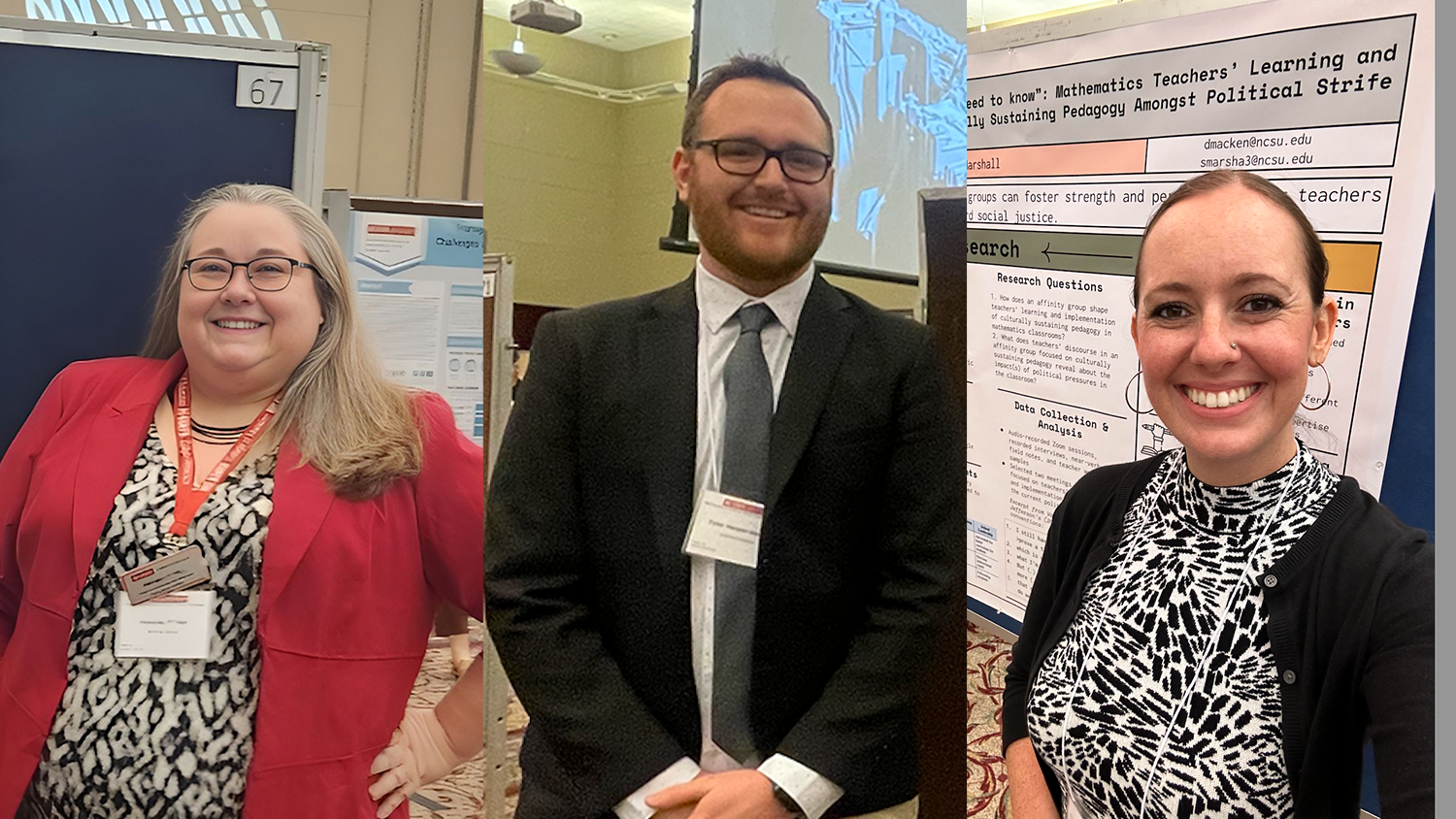
Three NC State College of Education students were recognized for their scholarly work during the 2024 Graduate Student Research Symposium, held recently at NC State.
This year’s Graduate Student Research Symposium featured poster presentations from more than 200 students across NC State University and winners from each college were selected based upon the quality of their research, the effectiveness of their poster presentation, their oral communication skills and the creativity and aesthetic appeal of their poster.
College of Education doctoral students Amanda JF Hall, Tyler Harper-Gampp and Devan MacKenzie took home the first-, second- and third-place prizes in the education category, respectively.
Learn more about these students and their research in the pieces below:
Amanda JF Hall
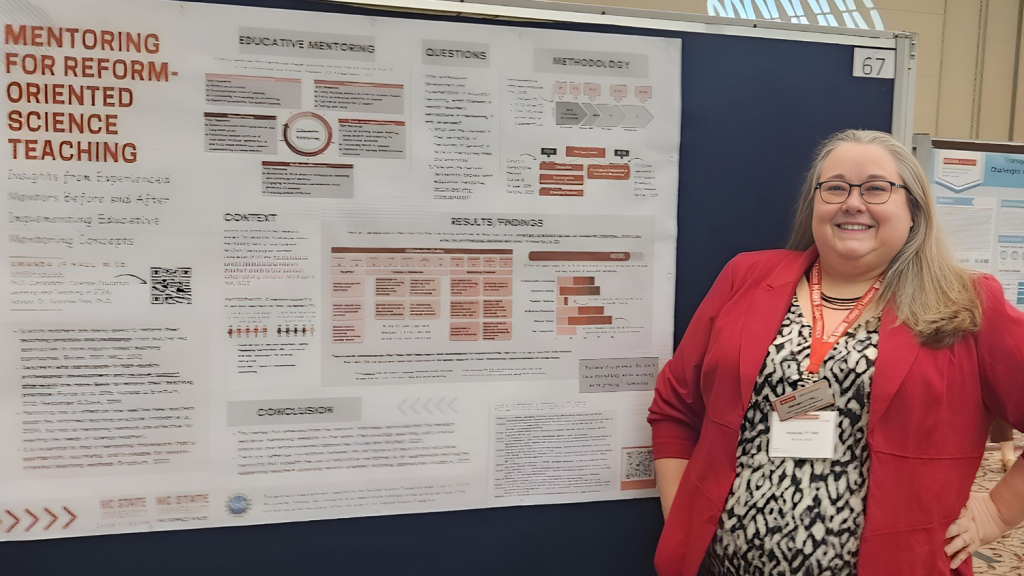
Ph.D. in Learning and Teaching in STEM science education concentration
Advisor: Alumni Distinguished Graduate Professor of Science Education Soonhye Park
At the beginning of her doctoral journey, Amanda JF Hall was diagnosed with ADHD and found herself struggling to work within traditional research methods. As a result, she has struggled with imposter syndrome throughout her Ph.D. journey.
For that reason, she was pleasantly surprised when she heard her name called as the first-place winner in the education category during the 2024 Graduate Student Research Symposium.
“It is not an understatement to say that I was genuinely surprised when I heard my name called, having put myself out of consideration when compared to the impressive work of my peers,” Hall said. “Since winning I have experienced a surge of motivation to progress through the final stages of my dissertation research and have confidently scheduled the date of my defense – which I had been avoiding.”
Hall’s award-winning presentation, entitled “Mentor Teachers’ Perceptions of Mentoring for Reform-Oriented Science Teaching Before and After Implementing Educative Mentoring Concepts,” is based on three years of work with mentor teachers to learn how, why and what they mentor in modeling instruction. The work is part of a National Science Foundation-funded project led by Alumni Distinguished Graduate Professor of Science Education Soonhye Park.
As part of the project, Hall interviewed experienced mentors to gain insights into what mentors consider important for mentoring in-service teachers who are learning to reform their science teaching practices. Findings showed mentors’ perceptions are fundamentally connected to concepts of educative mentoring, which is a construct of mentorship that is theoretically similar to the practices of reform-oriented science instruction.
Results of this study, Hall said, will help the project team design professional development tools to fit the concepts of educative mentoring in practice.
“I have personally been affected by both strong and weak mentors throughout my professional teaching career,” Hall said of her interest in this topic. “Mentorship is one of those things that we have all likely experienced but is not consistently defined or designed. As I desire to be an agent of change, specifically to encourage pre- and in-service teachers to adopt reformed science teaching, I decided to start with finding and defining that support.”
Winning a prize for her research brings Hall’s journey in the College of Education full circle, as she prepares to graduate in Fall 2024.
As a fifth grade science teacher, she was able to bring her students to the State Science and Engineering Fair held at NC State’s Talley Student Union. While there, she spoke with graduate students in the Ph.D. in Learning and Teaching in STEM program who invited her to the annual STEM Education Research Symposium and inspired her to enroll in the program herself.
“My program would be nothing without the people. The professors and instructors have created a solid foundation for success in navigating the landscape of academia, graciously offering up their advice and feedback to ensure we are successful. Similarly, I have been fortunate to have collaborated with many fellow graduate students in the program and gained so much more than knowledge,” she said. “I am confident that the professional and personal relationships I have built within this program and throughout the entire College of Education will endure even after I have left campus to embark on my academic career.”
Tyler Harper-Gampp
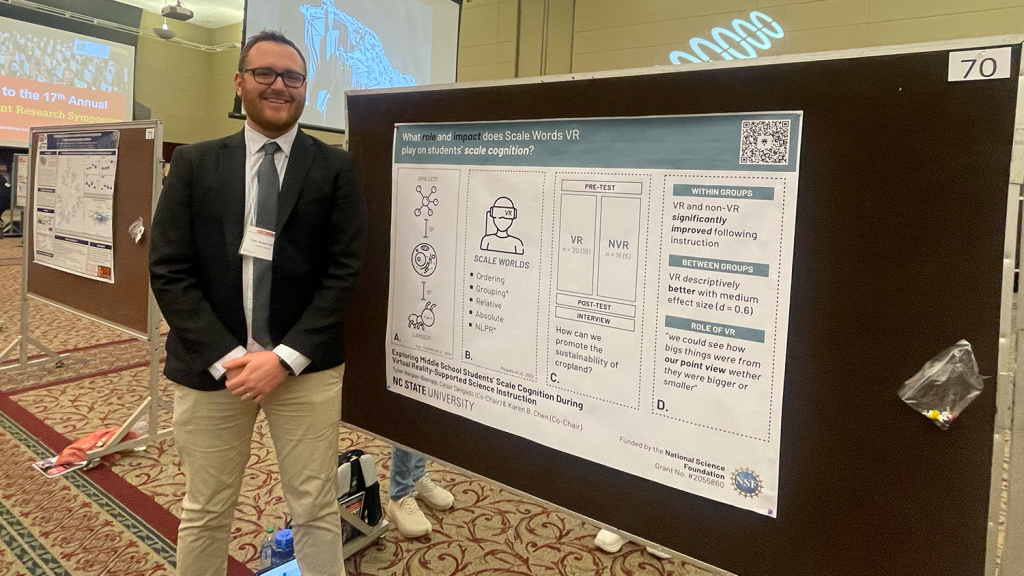
Ph.D. in Learning and Teaching in STEM science education concentration
Advisor: Associate Professor of Science Education Cesar Delgado
As a classroom teacher, Tyler Harper-Gampp was fascinated with the idea of exploring ways in which he could leverage technology to support and enrich his students’ learning and led efforts related to student-centered learning at his school.
This passion inspired him to seek out opportunities to explore how and when technology can support instruction in a way that addresses inequalities in STEM education and, ultimately, led him to the NC State College of Education for his doctoral degree.
During his time in the college, he has worked alongside Associate Professor of Science Education Cesar Delgado in the development of a virtual reality (VR) instructional tool called Scale Worlds that helps middle school students better understand scale, proportion and quantity. His research related to this work recently earned him the second-place prize in the education category at the 2024 Graduate Student Research Symposium.
“Winning second place at the Graduate Research Symposium is a meaningful recognition of the effort and quality put into my research project. It serves as motivation to continue pushing the boundaries of knowledge and innovation in my field,” Harper-Gampp said.
Harper-Gampp’s presentation, entitled “Exploring Middle School Students’ Scale Cognition During Virtual Reality-Supported Science Instruction,” measured the impact of Scale Worlds on students’ scale reasoning through its use in a nine-day, co-designed instructional unit.
Results from the study found students who used the VR program as part of the unit had a slightly higher accuracy of absolute size estimate and relative size estimate and showed greater aggregate performance.
As Harper-Gampp prepares to graduate this summer, he feels ready to take on the next step as a scholar and researcher thanks to the collaboration, challenges and rigor he experienced during his time in the College of Education.
“The support and mentorship provided by the faculty have been invaluable in preparing me for my future career in academia. Their guidance has not only helped me navigate the complexities of academia but has also equipped me with practical skills and knowledge for success in my future position,” he said.
Devan MacKenzie
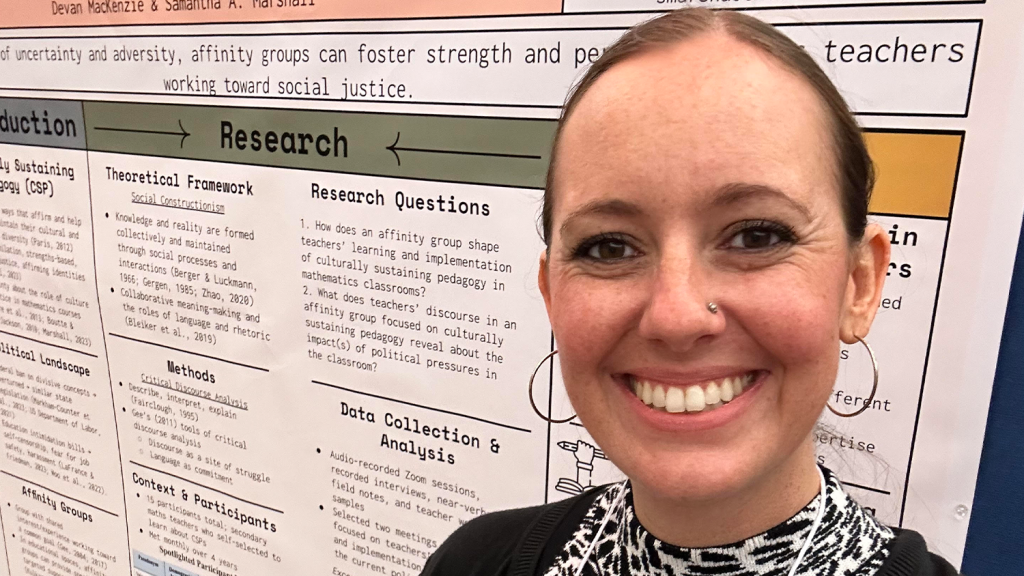
Ph.D. in Teacher Education and Learning Sciences educational equity concentration
Advisor: Assistant Professor of Mathematics Education Samantha Marshall
Centering equity in education has always been important to Devan MacKenzie, so when she was looking for doctoral programs, the opportunity to earn a Ph.D. in Teacher Education and Learning Sciences with a concentration in educational equity led her to the NC State College of Education.
Now, she is furthering her interest in the topic of equity through her research, which recently won a third-place prize at the 16th annual Graduate Student Research Symposium.
“It’s an honor to have my work recognized and celebrated, and I appreciate my advisor, Dr. Samantha Marshall, for the nomination and opportunity,” she said.
MacKenzie’s presentation, entitled ‘“This is Information our Students Need to Know:’ Mathematics Teachers’ Learning and Sensemaking of Culturally Sustaining Pedagogy Amongst Political Strife,” examines the discourse of an affinity group of math teachers working together to learn about culturally sustaining pedagogy.
The study found teachers struggle to balance teaching subject content with social justice while highlighting the importance of teacher affinity groups which, in this case, provided crucial learning opportunities for math educators and provided them with a space to navigate culturally sustaining pedagogy while acknowledging the challenges of implementation.
“I’ve taught about culturally sustaining pedagogy (CSP) with pre-service teachers [in the College of Education] in ECI 305 and ECI 204, but I was interested in learning more about how in-service teachers learn about and implement CSP once they are in the classroom,” MacKenzie said of why she chose to study this topic.
Browse College of Education Photos from the Event
- Categories:
